How does family shape the values and identities of Filipinos? In the Philippines, family is seen as the base of social life. It includes not just blood relatives but also distant relatives, neighbors, and friends. This shows the deep connections within families and how family shapes who we are.
Family gatherings and celebrations are big in Filipino culture. Many people take part in these events, showing how important family ties are. The term “kapamilya” means family member, showing the wide network of relatives in Filipino society. It shows a strong sense of community and connection.
Family also acts as a safety net in the Philippines. They offer financial and practical help to each other. This shows the value of family in providing support and care.
Key Takeaways
- Family is the foundation of social life in the Philippines, extending beyond genetic connections to include distant relatives, neighbors, and friends.
- Family gatherings and celebrations play a significant role in Filipino culture, reinforcing family bonds and values.
- Filipino families tend to stay together throughout the entire life cycle, displaying a highly centralized unit.
- Economic support within Filipino families serves as a safety net, providing financial assistance and practical help.
- Family values are deeply rooted in Filipino culture, influencing individual identities and relationships.
- The concept of family in the Philippines reflects a strong sense of community and interconnectedness.
The Importance of Family in Filipino Culture
Family is the heart of Filipino society. It is deeply rooted in the country’s tradition and culture. Filipinos believe each family member has duties and responsibilities. It’s important to respect others and keep harmony in the family.
In the Philippines, family goes beyond just immediate relatives. Extended families are key in Filipino lives. Distant blood relatives are seen as part of the family’s support system. The clan offers security and support, helping during illness or job loss.
Family decisions are made together, with elders’ advice being very important. This respect for elders and tradition strengthens family bonds. It promotes unity and cooperation.
- Strong family ties, with children expected to care for their parents in their old age
- A sense of mutual responsibility, with wealthier family members expected to assist those who are less fortunate
- A emphasis on respect for elders and tradition, which helps to promote unity and cooperation within the family
The role of family in Filipino culture is immense. It is a vital part of the country’s tradition and culture. It shapes the values and beliefs of Filipinos.
Family Values: Guiding Principles
Family values are the core of a family’s identity. They are passed down through generations, influencing family members’ behavior and attitudes. In Filipino culture, values like respect, unity, and love are key. Respect for elders is a core value, teaching children to honor and care for their parents and grandparents.
Family values also stress unity and support. Family members are urged to work together, share duties, and support each other when needed. This unity is built through family gatherings, traditions, and rituals. For example, many Filipino families focus on love and affection. They show their care through physical touch, spending quality time, and open communication.
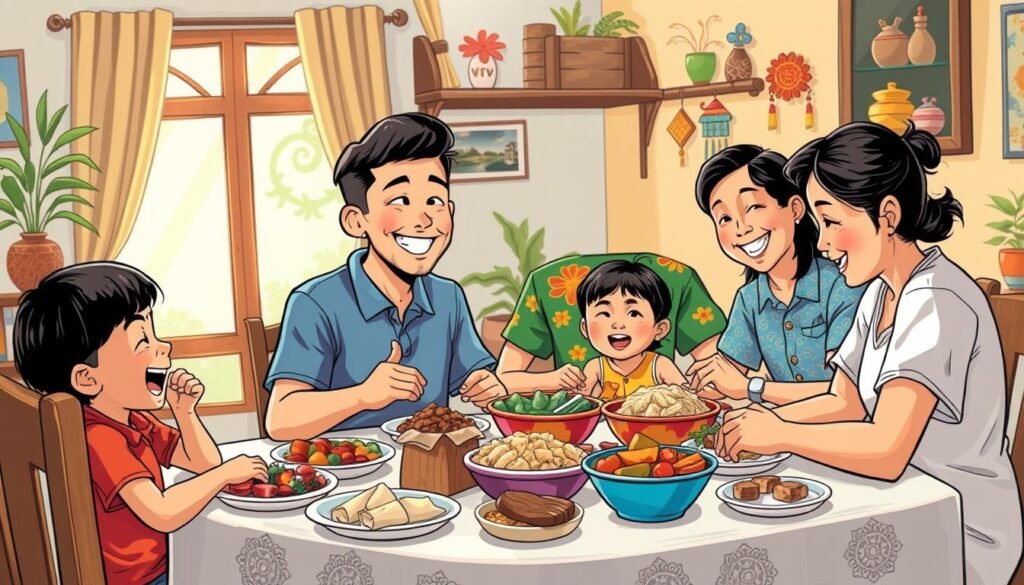
- Respect for authority and tradition
- Unity and cooperation among family members
- Love and affection for one another
- Support for each other’s well-being and success
By teaching these values to their children, Filipino families aim to build a strong sense of identity and belonging. This helps family members form positive relationships, make good choices, and contribute to their community’s well-being.
Celebrations: Family Gatherings and Traditions
Filipino families value tradition and culture a lot. They celebrate big with family gatherings. These happen on holidays and special days.
Big family events include Christmas, New Year’s Eve, and the Flores de Mayo festival. These are filled with tradition and fun. You’ll find traditional foods, music, and dance.
Food is key in Filipino family gatherings. It shows love, care, and unity. Dishes like adobo, sinigang, and lechon are favorites. They bring families closer and strengthen their bonds.
There are also smaller rituals and customs. Like eating together as a family. This makes families feel closer and shows family’s importance in Filipino culture.
Major Family Events and Festivals
- Christmas
- New Year’s Eve
- Flores de Mayo festival
Rituals and Customs
Filipino families have many rituals. Like eating together as a family during meals.
Food as a Family Bond
Traditional dishes like adobo, sinigang, and lechon are served on special days. They bring families closer and strengthen their bonds.
| Family Event | Traditional Food |
|---|---|
| Christmas | Lechon |
| New Year’s Eve | Adobo |
| Flores de Mayo festival | Sinigang |
Economic Impact of Family Structure
The family structure in the Philippines greatly affects the economy. In many Filipino families, everyone’s income is combined. The matriarch manages the family’s money. This is a common values in Filipino culture, where everyone works together for financial stability.
Family businesses are also key in the community. They offer jobs and help the local economy. These businesses are run by family members, who work together every day. Family support systems are also vital, providing a safety net for family members in need.
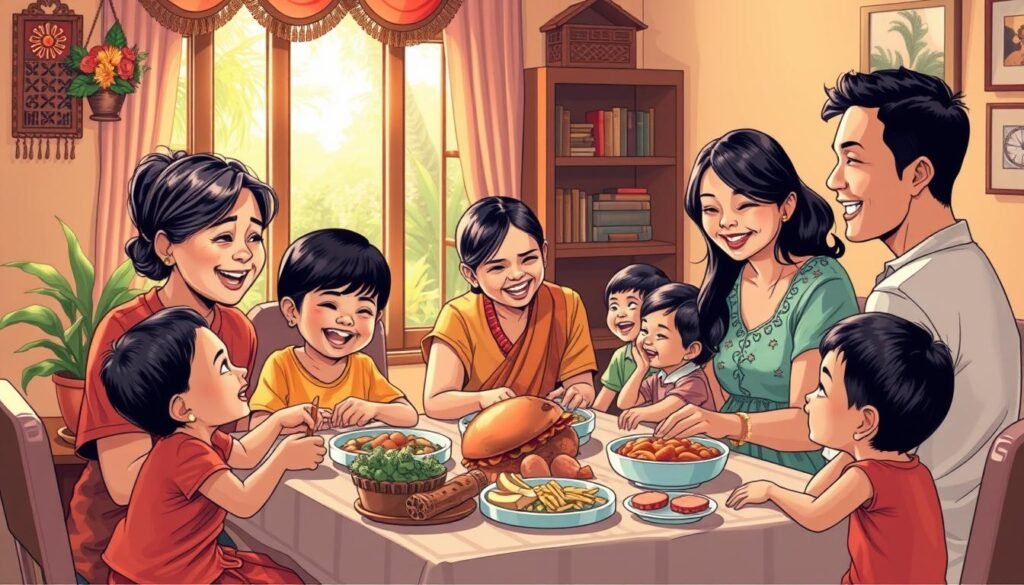
- Collective financial practices, like pooling income and sharing expenses
- Family businesses, which provide jobs and boost the local economy
- Support systems among families, which offer a safety net in tough times
In the Philippines, families are seen as essential to the economy. The government supports family businesses and values. Understanding the economic role of family structure helps us see the importance of family in Filipino culture. It encourages creating a supportive and stable environment for families to succeed.
The family is the foundation of the economy, and by working together, we can build a stronger and more prosperous future for all.
Education: The Family’s Role in Learning
Family is key in shaping a child’s educational goals and success. In the Filipino culture, family is the main place where children learn values and traditions. These values greatly impact their school performance.
Studies show that family background affects kids’ school grades early on. For example, city kids’ grades are more influenced by their family’s wealth than country kids. Also, family wealth is now a big factor in how well a child does in school.
Some important things that help a child do well in school include:
- Parents getting involved in their child’s education, which helps kids do better in school
- Family wealth, which has a bigger impact on kids’ grades than school itself
- Cultural values and traditions passed down from parents, which shape kids’ goals and grades
Understanding how family impacts education helps us create a better learning environment. This environment supports academic success and keeps the tradition of learning alive in Filipino culture.

The Filipino saying “Ang pag-aaral ay pag-asenso” (Education is progress) shows how important education is in their culture. By valuing education and creating a supportive home, families can help their kids succeed in school.
| Factor | Influence on Education |
|---|---|
| Family Socioeconomic Status | Affects academic achievement and educational attainment |
| Parental Involvement | Improves academic performance and educational aspirations |
| Cultural Values and Traditions | Shapes educational aspirations and influences academic achievement |
Family as a Source of Emotional Support
Family is key in giving emotional support. In tough times, a strong family bond helps people deal with life’s ups and downs. Emotional intelligence is important for healthy family ties. It lets family members get each other’s feelings.
Coping with Life’s Challenges
A supportive family helps build resilience. Spending quality time together strengthens family bonds. This creates a sense of belonging, improving mental health and well-being.
Building Resilience Together
Family values like respect, unity, and love are vital. Teaching these values to kids helps them grow emotionally smart. A strong family support system helps face big life changes, like divorce or widowhood.
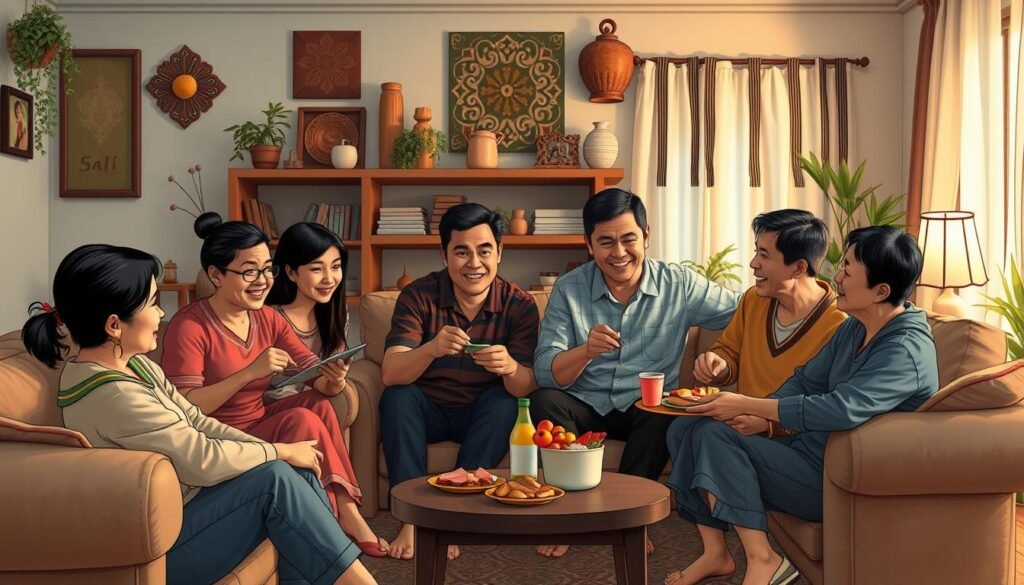
Mental Health Awareness
It’s important to talk about mental health in families. Encouraging open talks and seeking help when needed supports mental health. This makes families happier, healthier, and more resilient.
Family in Filipino Society: Past and Present
The Filipino family has seen big changes over time. These changes are influenced by the country’s rich tradition and culture. Today, the average Filipino household has 5.3 members in cities and 5.4 in rural areas. This shows that family bonds are very strong.
Recently, the idea of family has grown. Many Filipinos live abroad but keep close ties with family back home. This change comes from the country’s labor export, spreading families worldwide.
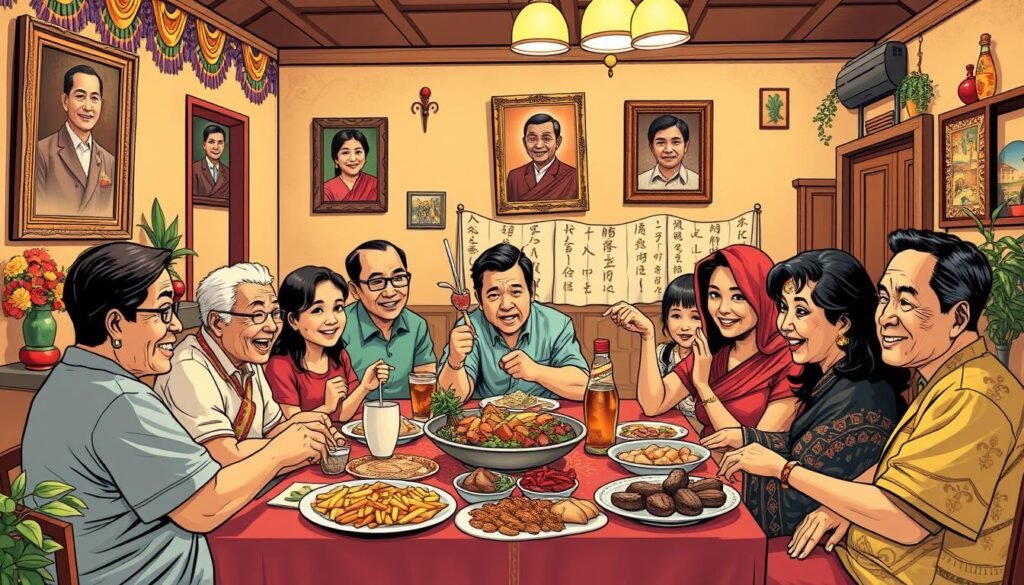
Even with these changes, family’s role in Filipino culture stays the same. It’s common for Filipino families to welcome new members, showing love and acceptance. Key parts of Filipino family tradition include:
- Close family ties and strong support networks
- Respect for elders and tradition
- Inclusivity and acceptance of new family members
As the Filipino family evolves, it’s key to value tradition and culture. These elements shape family values and bonds. By understanding and valuing these, we can build stronger, more united families that can handle change.
Legal Implications of Family Relations
The Family Code of the Philippines started on August 3, 1988. It sets rules for family life and what makes a marriage valid. Family values are key in Filipino culture. The law supports these values by requiring family members to help each other.
In the Philippines, family laws touch everyone in the family. They make sure family members help each other out. This includes parents and kids, spouses, and siblings who can’t work because of health issues. 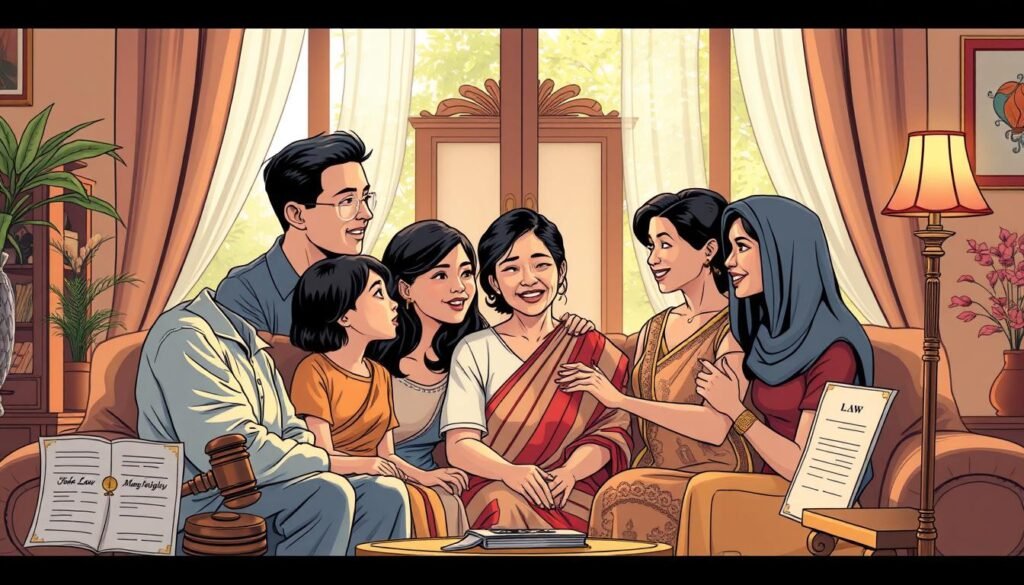
Here are some main points about family law in the Philippines:
- Marital laws and family rights
- Custody and child support issues
- Adoption and its legal implications
These laws aim to protect family members’ rights and happiness. They also encourage family values like respect, unity, and love.
| Aspect of Family Law | Description |
|---|---|
| Marital Laws | Regulate the legal capacity of contracting parties, authority of the solemnizing officer, and possession of a valid marriage license |
| Custody and Child Support | Outline the rights and responsibilities of parents in relation to their children |
| Adoption | Govern the legal process of severing ties between adopted children and biological parents, transferring parental authority to adoptive parents |
In conclusion, family laws in the Philippines are complex. They show the country’s focus on family values and protecting family members’ rights and well-being.
The Role of Religion in Family Life
Religion is key in shaping family values and tradition in the Philippines. Many Filipinos believe in duties and responsibilities within the family. They think respecting others and keeping harmony is essential.
Research shows that 40% of teens go to religious services with both parents. Another 25% go with just one parent.
Religion deeply affects family relationships and values in the Philippines. For example, 60% of teens say their families often talk about religion. Also, 48% say they sometimes say grace before meals together.
Prof. Dr. Dariusz Krok notes that religious and moral values are important. They help build family relationships and values.
A study by Prof. Dr. Dariusz Krok found that the western world lacks religious value. But in Filipino families, religion is very important. Research shows that family is sacred in Islam, as stated by Dr. Şule Albayrak.
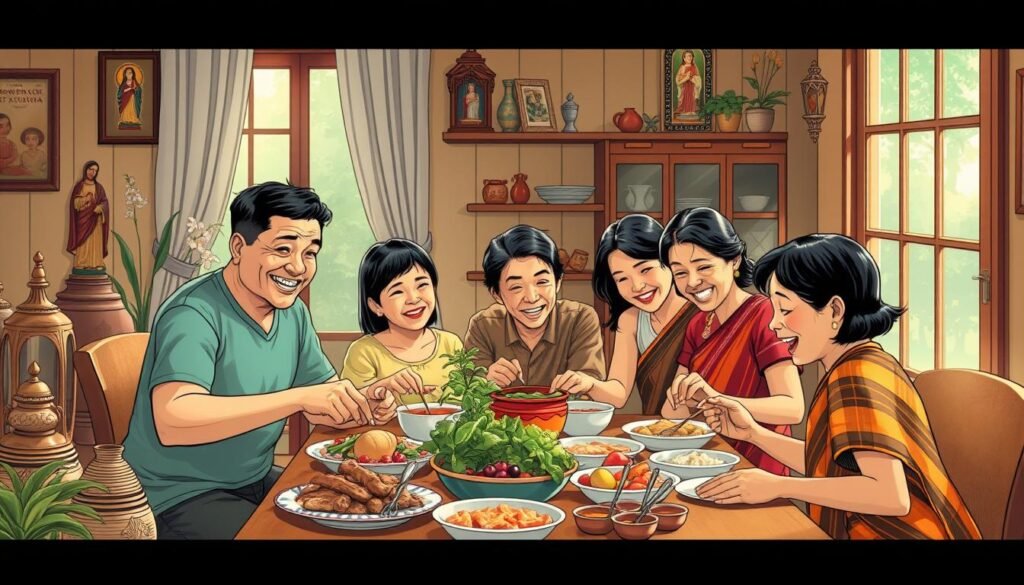
Here are some statistics on the role of religion in Filipino families:
- 25% of U.S. adolescents say they read religious scripture with their family at least sometimes.
- 18% of U.S. teens say they enjoy doing religious things with their families “a lot,” while 34% enjoy them “some.”
- 10% of teens say they do religious things mainly because their parents want them to “a lot,” while 33% do so “some” of the time.
In conclusion, religion is very important in shaping family values, tradition, and culture in the Philippines. Understanding its role helps us value and preserve these values for the future.
| Statistic | Percentage |
|---|---|
| Teens attending religious services with both parents | 40% |
| Teens attending religious services with only one parent | 25% |
| Teens saying grace before meals with their family | 48% |
Social Issues Affecting Filipino Families
Filipino families deal with many social issues that affect their happiness and relationships. One big challenge is urbanization, which can cause families to be apart and feel stressed. In 2010, many men and women in the Philippines were separated, showing the need for family support and counseling.
Another big issue is poverty, which can make families fight over money. With so many households in the Philippines, families are key in shaping society. But money problems can lead to fights at home. Some common reasons for fights include:
- Financial problems
- Addiction
- Infidelity
- Unfair distribution of household chores
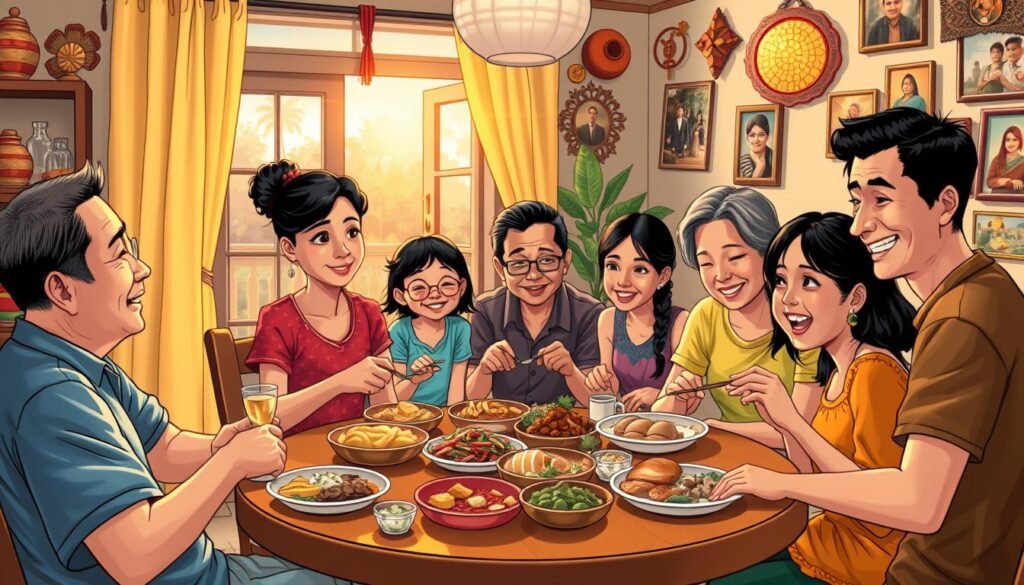
These problems can really hurt family members, like children. It’s important for Filipino families to face these issues and build stronger bonds. By doing this, they can teach family values like respect, unity, and love. These values are key for a happy and healthy family life.
| Issue | Impact on Family |
|---|---|
| Urbanization | Family separation and stress |
| Poverty | Financial stress and conflict |
| Migration | Emotional trauma and family separation |
The Role of Gender in Family Dynamics
In the Philippines, tradition and culture shape gender roles in families. The country leans towards a matriarchal society, with women leading in business and government. This change has made family responsibilities more balanced.
Some key aspects of gender roles in Filipino families include:
- Women’s increasing participation in the workforce and decision-making processes
- Men’s growing involvement in childcare and domestic responsibilities
- A shift towards more egalitarian relationships between partners
The Philippines is moving forward in gender equality. More women are in leadership, and men are helping out more at home. This shift is seen in the culture and tradition of Filipino families, where women’s contributions are valued.
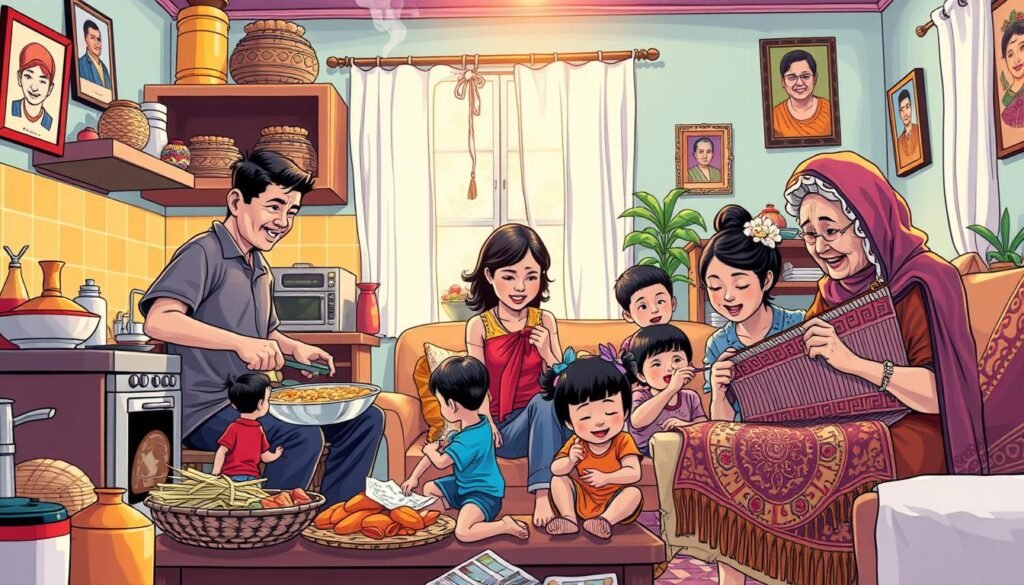
The role of gender in Filipino families is changing, with a focus on equality and shared duties. As the country grows and changes, tradition and culture will continue to influence family life.
| Aspect of Gender Roles | Traditional View | Modern View |
|---|---|---|
| Women’s participation in the workforce | Limited | Increasing |
| Men’s involvement in childcare | Minimal | Growing |
| Decision-making processes | Patriarchal | Egalitarian |
Family and Health: Shared Responsibilities
Family is key to staying healthy and happy. In the Philippines, family always comes first. But, it’s important to remember to take care of yourself too.
Studies show that when families share tasks, they have fewer arguments. This is because they value working together and respect each other.
Health Awareness and Education
Learning about health together is very important. Families can talk about good eating, exercise, and staying healthy. This helps everyone stay well.
Family Fitness Activities
Doing sports or exercises together is great for health and bonding. It’s fun to walk, jog, or play sports as a family. It helps everyone stay active and support each other.
Caring for Elderly Family Members
Taking care of older family members is a big responsibility. It means giving emotional support, helping with daily tasks, and making sure they get the healthcare they need. Working together, families can give the best care to their elderly loved ones.
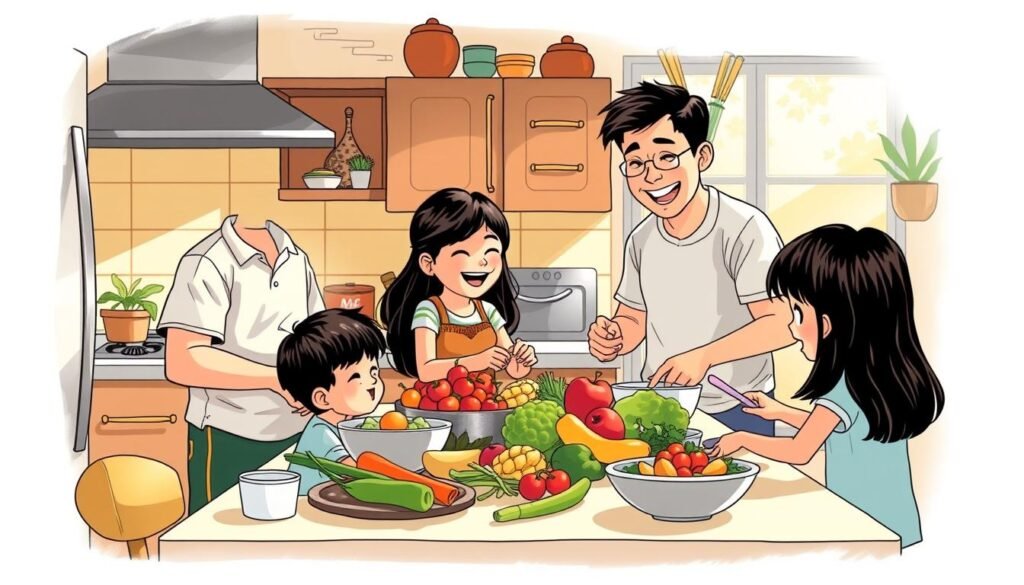
| Family Health Aspect | Importance |
|---|---|
| Health Awareness and Education | Promotes healthy habits and overall well-being |
| Family Fitness Activities | Encourages physical health and bonding |
| Caring for Elderly Family Members | Provides emotional support and complete care |
The Role of Family in Socialization
Family is key in teaching social skills and behaviors, very important in the Filipino culture. It’s where children first learn about society’s norms and values. Research shows that family is a big part of this learning for Filipinos.
In Filipino families, cultural values and traditions are passed down. Children learn what’s right and wrong by watching their parents. The family also helps with emotional growth, providing support and care.
For example, the story of Teresa Magbanua shows how family shapes values and actions.
Some important parts of family socialization are:
- Teaching social norms and ethics
- Providing emotional support and nurturing
- Role modeling and imitation
- Exposure to various social spaces
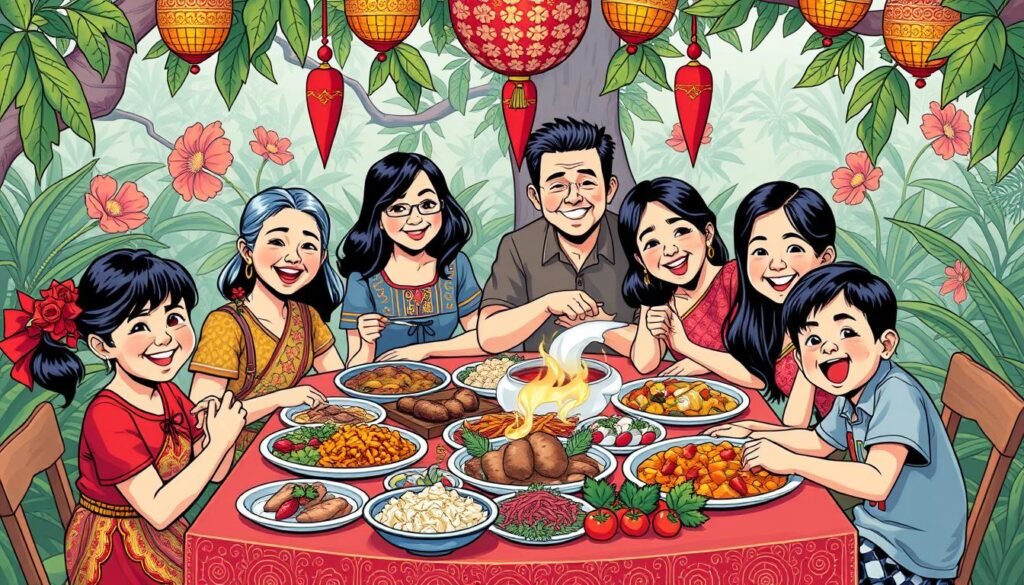
Understanding family’s role in socialization helps us see the value of tradition and culture. It’s vital to recognize family’s role in creating a strong, responsible person.
Family Resilience in Times of Crisis
Family resilience is key in tough times. It helps families face challenges and come back stronger. Studies show that families with more resilience feel less anxiety, stress, and depression during crises like the COVID-19 pandemic.
The ability of families to bounce back after tough times depends on several factors. These include current stress, past stress, coping skills, and available resources.
A study by CFEG shows how important family closeness is in hard times. Family members can offer emotional support and help each other deal with problems. Resilient families are known for effective communication, adaptive problem-solving, and keeping up with routines and rituals, even when things get tough.
Resilient families see crises as challenges they face together. They accept their feelings, keep hope alive, and avoid blaming or feeling guilty. They also stay connected to positive beliefs and find good in tough times. They know how to solve problems and find help when needed.

- Providing developmentally appropriate information to children
- Allowing a range of emotions to be expressed while respecting individual differences
- Limiting children’s exposure to distressing media coverage
- Preserving routines, rituals, and family roles to the extent possible
By using these strategies and focusing on family values, families can grow stronger. They can face challenges together and come out even more united.
The Future of Filipino Families
The Philippines is facing big changes with modernization and globalization. Filipino families are trying to keep their tradition and culture alive while the world changes fast. A study by Maria Isquixotic shows how Overseas Filipino Workers (OFW) and single-parent households are changing family life. There’s also more acceptance of LGBTQ+ families.
The future of Filipino families will be influenced by the economy, education, and technology. Many Filipinos work abroad, changing family structures. To keep their tradition and culture alive, families must adapt to these changes.
Some key trends and changes in family structures include:
- Increased number of single-parent households
- Rise of LGBTQ+ acceptance
- Impact of OFW on family dynamics
- Changing roles of men and women in the family
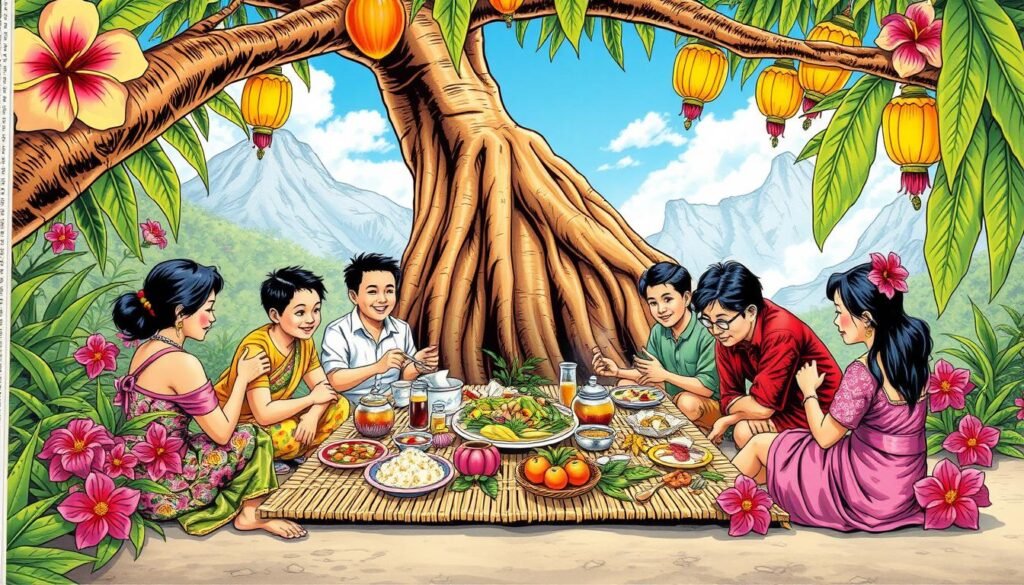
In conclusion, the future of Filipino families depends on balancing their tradition and culture with the changing world. By understanding these trends, families can preserve their heritage while adapting to modern challenges.
| Family Wellbeing Dimensions | Indicators |
|---|---|
| Resource Adequacy | Family having sufficient food to eat every day, ability to send children to school, access to medical and health needs |
| Comfortable Lifestyle | Providing simple wishes of children, choice over basic needs, enjoyment of leisure activities |
| Good Health of Family Members | Identified as a key family wellbeing dimension across all income groups |
Conclusion: Recognizing Family’s Role in Filipino Life
As we wrap up our look at Filipino family culture, it’s clear that family is at the heart of Filipino life. The tight bonds of extended family, cherished traditions, and values passed down through generations are key. These elements form the foundation of Filipino society.
While historical figures like Mariano Llanera fought for a free Philippines, family has always been a source of strength. It provides resilience and identity to the Filipino people.
In today’s world, it’s important to balance keeping family traditions alive with adapting to new needs. By valuing family, we help ensure Filipino culture stays strong, even as the country faces 21st-century challenges. The family’s lasting importance in Filipino life shows the enduring power of cultural values.
FAQ
What is the importance of family in Filipino culture?
Family is at the heart of Filipino life. It shapes who we are and gives us a strong sense of community. It includes not just immediate relatives but also extended family, neighbors, and friends.
What are the core values that guide Filipino families?
Filipino families value respect, unity, support, love, and affection. These values help keep the family together and happy.
How do Filipino families celebrate and maintain their traditions?
Families come together for big events and festivals. Food is a big part of these celebrations, helping to strengthen family bonds.
How does the economic structure of Filipino families impact their well-being?
Filipino families often work together financially. They run businesses and support each other, which helps everyone in the family.
What is the role of family in the education of Filipino children?
Family is key in a child’s education in the Philippines. Parents get involved, teach cultural values, and support higher education.
How does family provide emotional support in Filipino culture?
Families offer emotional support in the Philippines. They help people deal with life’s challenges, build resilience, and promote mental health.
How have Filipino families adapted to societal changes over time?
Filipino families have changed over time. They’ve kept their values and traditions while adapting to new things like technology.
What are the legal aspects of family relations in the Philippines?
In the Philippines, family laws cover marriage, rights, custody, and adoption. These laws affect family relationships and well-being.
How does religion influence family life in the Philippines?
Religion shapes family values and celebrations in the Philippines. The church also plays a big role in family relationships.
What social issues impact Filipino families, and how do they respond?
Issues like urbanization, poverty, and migration affect Filipino families. They adapt and find ways to keep their bonds strong.
How do gender roles influence family dynamics in the Philippines?
In the Philippines, gender roles are changing. Women are now more involved in family decisions, changing family dynamics.
How do Filipino families prioritize health and well-being?
Families share the responsibility of keeping everyone healthy. They focus on health education, fitness, and caring for the elderly.
What is the role of family in the socialization of Filipino individuals?
Families teach social norms and encourage community involvement in the Philippines. They help shape social skills and community spirit.
How do Filipino families demonstrate resilience during times of crisis?
Families draw on their history and support each other during tough times. This helps them rebuild and stay strong.
What are the emerging trends and changes in Filipino family structures and traditions?
Filipino families are evolving with new trends and changes. They adapt to globalization while keeping their cultural heritage alive.
Source Links
- Family Ties: The Heartbeat of Filipino Culture – https://www.nipino.com/family-ties-the-heartbeat-of-filipino-culture
- Understanding the Value of Filipino Family Relationships | Diversify OSS – https://hgsoss.com/newsroom/understanding-the-importance-of-family-to-your-filipino-workforce/
- The Importance of Family in Filipino’s Workforce Success – https://emapta.com/blog/the-importance-of-family-a-fire-that-fuels-the-filipino-workforce/
- Filipino Families in the Philippine Culture – https://subliblog.com/2019/06/16/filipino-families-in-the-philippine-culture/
- 7 Values for Strong Families – https://www.webmd.com/balance/7-values-for-strong-families
- Guiding Principles – https://www.familycentre.org/guiding-principles
- Family values: 24 Examples to strengthen your family bonds – https://getmarlee.com/blog/family-values
- 20 Family Tradition Ideas to Strengthen Bonds and Make Memories – https://www.betterup.com/blog/family-traditions
- How To Create Your Own Family Traditions—And Why You Should – https://www.parents.com/family-traditions-to-enjoy-together-8627648
- Chapter 23: Family Structure – https://ecampusontario.pressbooks.pub/demographyandeconomics/chapter/chapter-23-family-structure/
- IJPSL A4 Covers – https://ijpsl.in/wp-content/uploads/2021/10/The-Impact-of-Unstable-Family-Structure-on-Economy-A-Comparative-Analysis-of-the-USA-and-India_Anshika-Sharma-Muskan-Gupta.pdf
- How does family background affect children’s educational achievement? Evidence from Contemporary China – The Journal of Chinese Sociology – https://journalofchinesesociology.springeropen.com/articles/10.1186/s40711-018-0083-8
- The role of family in education – https://www.britishschool.edu.pe/news/2023/05/10/the-role-of-family-in-education
- Family Relationships and Well-Being – PMC – https://pmc.ncbi.nlm.nih.gov/articles/PMC5954612/
- Highland Springs Specialty Clinic – The Top Ten Benefits Of Spending Time With Family – https://highlandspringsclinic.org/the-top-ten-benefits-of-spending-time-with-family
- Tips to Improve Family Relationships – https://www.helpguide.org/mental-health/wellbeing/improving-family-relationships-with-emotional-intelligence
- PDF – https://pssc.org.ph/wp-content/pssc-archives/Works/Amaryllis Torres/Re-thinking the Filipino Family, Tracking Changes Across the Years..pdf
- Strong Bonds: The Chemistry of Filipino Families – https://wya.net/blog/strong-bonds-the-chemistry-of-filipino-families/
- Understanding Civil Law on Family Relations in the Philippines — Respicio & Co. – https://www.lawyer-philippines.com/articles/understanding-civil-law-on-family-relations-in-the-philippines
- Family law | Definition, Examples, Types, & Facts | Britannica – https://www.britannica.com/topic/family-law
- eCodal – VOL I Persons and Family Relations – https://sites.google.com/view/e-codal/civil/civil-code/vol-i-persons-and-family-relations
- 4. Family religious practices – https://www.pewresearch.org/religion/2020/09/10/family-religious-practices/
- Religious Values are Very Important in Family Life – KADEM – https://kadem.org.tr/en/religious-values-are-very-important-in-family-life/
- Causes of Family Conflicts in the Philippines – https://www.empath.ph/blog/why-families-fight-causes-of-family-conflicts-in-the-philippines
- Addressing Toxic Behaviors in Filipino Families | #YourMindOurMovement – https://medium.com/@apasion96/addressing-toxic-behaviors-in-filipino-families-yourmindourmovement-2fc0774881ee
- Addressing Challenges Faced by Filipino Families – https://www.camella.com.ph/addressing-challenges-faced-by-filipino-families/
- 3. Gender roles in the family – https://www.pewresearch.org/religion/2022/03/02/gender-roles-in-the-family/
- Family Patterns of Gender Role Attitudes – https://pmc.ncbi.nlm.nih.gov/articles/PMC3270818/
- How to Share the Mental Responsibilities of Parenthood – https://www.parent.com/blogs/conversations/2023-share-mental-responsibilities-parenthood
- A Better Way to Divide and Conquer Household Responsibilities – https://www.imom.com/sharing-household-responsibilities/
- Responsibility, Care and Illness in Family Relationships – https://link.springer.com/chapter/10.1007/978-3-031-04166-2_6
- The Role of Families in Primary Socialisation – https://easysociology.com/sociology-of-family-relationships/the-role-of-families-in-primary-socialisation/
- 10 Roles of the Family in the Socialization Process: Let’s See! – Whiz – https://whiz.id/en/role-family-in-socialization-process/
- Building Family Resilience in Troubled Times – Center for Child Counseling – https://www.centerforchildcounseling.org/building-family-resilience-in-troubled-times/
- Frontiers | Family resilience in a social-ecological context – emotional difficulties and coping strategies – https://www.frontiersin.org/journals/psychology/articles/10.3389/fpsyg.2024.1421745/full
- PDF – https://www.nctsn.org/sites/default/files/resources//family_resilience_and_traumatic_stress_providers.pdf
- PDF – https://www.ifhe.org/fileadmin/user_upload/e_Journal/Vol_15_2_corr/P11_1.pdf
- The Filipino family post pandemic – https://pids.gov.ph/details/the-filipino-family-post-pandemic
- PDF – https://pssc.org.ph/wp-content/pssc-archives/Works/Virginia Miralao/The_Family Traditional Values and the Sociocultural Transformation of Philippine Society.pdf
- Filipino family – https://www.slideshare.net/slideshow/filipino-family-52200350/52200350

